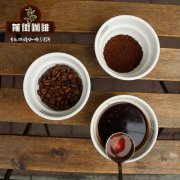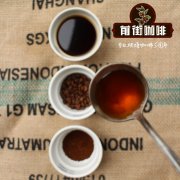Is Rabirika a boutique coffee? why has it not been promoted in the wild?

The most common varieties in the coffee industry are Arabica and Robusta, but there is also Laiberia coffee that is often forgotten by the public, and this variety is often recognized by the boutique coffee industry as "bitter, metallic and woody" coffee, making it even less valued.
Recently, a team of Malaysian and German professionals questioned whether the breed was worth exploring from a sensory point of view, where appropriate. Does this variety have the potential to be popular with the public in terms of flavor and quality, or even become a substitute for mainstream varieties?
According to these researchers and coffee experts, this is possible.
Not long ago, there was the first coffee festival held specifically for Liberia, which was held in Kuching, at the northwest end of Borneo, Malaysia. This is not just an event to satisfy curiosity, but a Borneo coffee seminar hosted by the Earthlings Coffee Seminar, with topics including variety discussion, cup testing and even bean baking competitions.
The author had never tasted Leiberia's coffee before, so he tried this variety with reservations. However, after drinking several samples alongside the nearby geisha and bourbon on the cup test table, the authors believe that the variety is unique and that its flavor combines the flavors of general coffee, such as dark chocolate and lemon, as well as confusing flavors such as sausages and jackfruit.
Dr. Steffen Schwarz, the German coffee consultant who presided over the cup test, said the cup test was sorted in order of sweetness, starting from Robusta, all the way to Arabica, and ending with Liberia.
Yes, you read it right. According to these scientists, Liberia is actually sweeter than Arabica. And after the author actually tested all the coffee, he also began to believe this argument.
Forgotten species
Most of the world's coffee trade is in Arabica and Robsta, of which Liberia accounts for less than 1%, because only a few Asian and African countries grow this variety for commercial use.
Liberia is considered inferior to Robsta, so it has never been paid attention to by the boutique coffee industry. Another problem is that coffee trees in Liberia are much taller than Arabica and Robusta, and a tree can grow to 15 meters, so it takes more labor to grow and harvest.
Dr Schwarz, however, believes the breed has been unfairly ignored.
Schwarz told the author at the event: "I have always been skeptical about the way the coffee industry talks about varieties. There is so much second-hand information that has no scientific basis." When I started the coffee industry 24 years ago, although Liberia was the third largest species, there was little knowledge about it, which made me very curious. "
However, usually only a small amount is planted on each farm, and farmers may not even know that it is a Laiberian species, but call it by a local name. Dr Schwarz found that Liberia was used to lure coffee pulp bugs and other pests away from Arabica coffee, like a natural pheromone trap. Now Dr Schwarz is interested in the potential of its flavor.
"insects don't care about cup scores, they only care about aroma and sweetness, so when I see this phenomenon, I realize that it may be worth exploring," he said. "
Turning garbage into gold
The Laiberia tree has been planted in the semi-wild environment of Borneo in Malaysia for many years. Ancient literature indicates that leaf rust in Sri Lanka caused serious loss of local coffee in 1892. At this time, the British colonists found Bora in search of fertile land to grow coffee. But the coffee there was eventually abandoned and switched to more profitable crops such as tea, pepper and rubber, leaving only a small number of Laiberia trees.
Rave Sun Kwok, the sponsor of the seminar, said: "when we started focusing on boutique coffee, we told local farmers to cut down their Liberian trees and try to switch to Arabica coffee. We have been doing a lot of training with different boutique coffee associations, and these so-called experts tell us that Liberia is disgusting and tastes like rubber. "
While attending a course in Bangkok, Rave Sun Kwok and his business partner, Dr. Kenny, met with Schwarz, and the conversation quickly turned to the forgotten coffee variety.
"Schwarz told us to call coffee farmers in Borneo immediately and asked them to stop cutting down trees in Liberia," Rave recalls. "
After returning home, two coffee professionals in Malaysia gathered some semi-wild Liberia. However, these coffees are not treated and roasted in traditional ways such as Arabica and Robusta, but using new methods proposed by Schwarz: these methods take into account the high sugar content of Liberia and are used in fermentation and roasting.
"what surprised us was that the beans were very good, sweet and fruity, unlike Ethiopian coffee or geisha, but expressed in different ways, with exotic Asian fruits such as jackfruit, local mangoes and bananas, and even durian," Rave said. "
In 2018, the boutique Liberia from Borneo made its debut at the Stuttgart Coffee Summit in Germany and won the coffee raw bean quality award.
Weak varieties from weak producing countries
Over the past few decades, coffee production in other Southeast Asian countries such as Thailand, Myanmar, Laos, Vietnam and China has been an important driver of the economy, with a general increase in income from production and exports.
After talking to coffee workers in Borneo, the author realized that as the global market is full of Arabica coffee, Liberia may provide a viable opportunity for differentiation.
Rave said: "Liberia is a weak coffee variety, Malaysia is also a weak coffee producing country, so it became the theme of our first Borneo coffee seminar. "
Schwarz thinks there is an exciting future in Liberia, near the equator, such as Borneo. It does not need the high altitude of Arabica coffee, and it can breed in almost any soil.
But does this generation need a third breed? Schwarz points to several reasons why this variety is needed. On the one hand, everyone likes sweet coffee, whether it's formula beans, cold extract, milk coffee or other mixed drinks.
The authors say the best cappuccino ever drunk is made from a concentrate extracted from Liberia, which is like entering a new era of coffee flavor.
However, when it comes to the future of the coffee tree itself, there are also some promising situations. Arabica coffee, for example, can be grafted onto the roots of Liberia, giving it the opportunity to create stronger and more delicious coffee. There is great potential for hybridization, among which the genetic composition of Liberia may contribute to the sweetness of future hybrids or the resistance of plants to diseases and insect pests.
In an era of potential extinction in Arabica, may it be an opportunity for this species to rise from the Borneo rainforest?
The original text was written by Asser Christensen and translated from Daily Coffee News.
Important Notice :
前街咖啡 FrontStreet Coffee has moved to new addredd:
FrontStreet Coffee Address: 315,Donghua East Road,GuangZhou
Tel:020 38364473
- Prev

Is Robusta's flavor worse than Arabica? can Robusta make hand coffee?
Is Arabica the only variety equated with taste and quality? Is Robusta always that bad? At present, about 40% of the world's Robusta species, which grows faster than Arabica and is more resistant to extreme weather, but farmers do not pay equal attention to it when producing and dealing with it. Because Robusta has a bad reputation for flavor, so
- Next

Why the coffee species in Ethiopia are all native species the historical reason for the word "native species"
When we talk about Ethiopian coffee, some people use words such as jasmine, rose fruit and magnolia to describe the smell of flowers, but have you ever wondered why these specific varieties with floral flavor are often summed up as "native species"? In the early days of the third wave of coffee, native species were often used to describe Ethiopian coffee, but this is not very accurate.
Related
- Detailed explanation of Jadeite planting Land in Panamanian Jadeite Manor introduction to the grading system of Jadeite competitive bidding, Red bid, Green bid and Rose Summer
- Story of Coffee planting in Brenka region of Costa Rica Stonehenge Manor anaerobic heavy honey treatment of flavor mouth
- What's on the barrel of Blue Mountain Coffee beans?
- Can American coffee also pull flowers? How to use hot American style to pull out a good-looking pattern?
- Can you make a cold extract with coffee beans? What is the right proportion for cold-extracted coffee formula?
- Indonesian PWN Gold Mandrine Coffee Origin Features Flavor How to Chong? Mandolin coffee is American.
- A brief introduction to the flavor characteristics of Brazilian yellow bourbon coffee beans
- What is the effect of different water quality on the flavor of cold-extracted coffee? What kind of water is best for brewing coffee?
- Why do you think of Rose Summer whenever you mention Panamanian coffee?
- Introduction to the characteristics of authentic blue mountain coffee bean producing areas? What is the CIB Coffee Authority in Jamaica?

